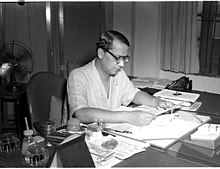|
Sukumar Sen (civil servant)
Sukumar Sen (2 January 1898 – 13 May 1963) was an Indian civil servant who was the 1st Chief Election Commissioner of India, serving from 21 March 1950 to 19 December 1958.[2] Under his leadership, the Election Commission successfully administered and oversaw independent India's first two general elections, in 1951–52 and in 1957. He also served as first Chief Election Commissioner in Sudan in 1953.[3] Sen was born on 2 January 1899 in a Bengali Baidya-Brahmin family. He was the elder or eldest son of a civil servant Akshoy Kumar Sen.[4] He was educated at Presidency College, Kolkata and at the University of London. He was awarded a gold medal in Mathematics at the latter. In 1921, Sen joined the Indian Civil Service, and served in various districts as an ICS officer and as a judge. In 1947, he was appointed Chief Secretary of West Bengal, the senior-most rank that an ICS officer could attain in any state in British India. He was still serving in that capacity when he was sent on deputation as chief election commissioner in 1950.[5] He was among the first recipients of the civilian honour of Padma Bhushan.[6] He married Gouri and had two sons and daughters each with her.[4] Sen was the elder brother of Ashoke Kumar Sen (1913–1996), Union Law Minister and a noted Indian barrister. Another brother was Amiya Kumar Sen, an eminent doctor, who was the last man to see Rabindranath Tagore alive.[7] It is said that Amiya Sen preserved Tagore's last poem, which he had written down at the poet's dictation, and later donated it to Indian Museum in Kolkata. Chief Election CommissionerSukumar Sen, in his role as the Chief Election Commissioner of India, was charged with overseeing the 1952 Indian General Election, which was the first election in the history of independent India.[8] Historian Ramachandra Guha wrote of Sukumar Sen in The Hindu in 2002, on the 50th anniversary of independent India's first general election:[9]
Tinker and Walker write that Sukumar Sen was aided by two Regional Election Commissioners plus one Chief Election Officer for each state. The ability of India's first political leaders to refrain from interfering with the machinery, as well as their decision to retain the Indian Civil Service (renamed the Indian Administrative Service with a few minor changes) gave Sen and his colleagues the freedom to adapt the machinery used by the British in the first Indian elections for the purposes of a general election. Niaz comments:[10]
Sen also oversaw the 1957 Indian General Election and used the existing election infrastructure to reduce costs and improve efficiency for the 1957 election. Guha writes: "this general election cost the exchequer Rs45 million less than the previous one. The prudent Sen had safely stored the 3.5 million ballot boxes the first time round and only half a million additional ones were required".[11] Other activitiesSen was the first Vice-Chancellor of Burdwan University, which started on 15 June 1960. Uday Chand Mahtab and the then Chief Minister of West Bengal, Dr. Bidhan Chandra Roy, facilitated the establishment of this university. As a mark of respect and to perpetuate his memory the road leading from G.T. Road to Golapbagh, Burdwan has been named after him as Sukumar Sen Road. Further a street in Sudan has also been named after him to mark a respect and for the conduct of election there in 1953. References
Sources
|
||||||||||||||||||||||||||||||||||
